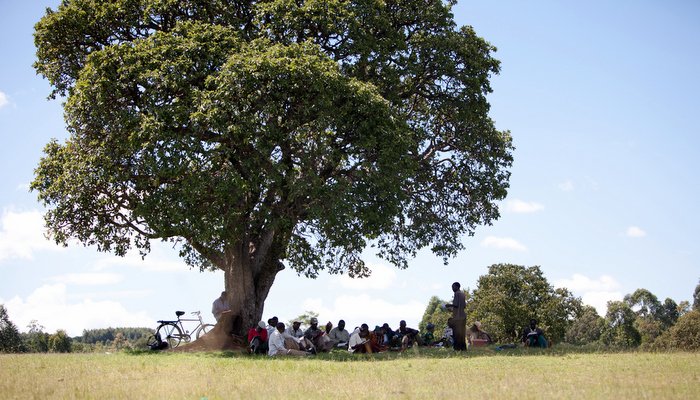Involving key stakeholders when initiating a project in a new community is essential to the success of any intervention. If a community is involved from the start, it is more likely that the community will accept the programs, become active decision-makers and ultimately advocates and ambassadors for the program. Nuru Kenya takes great care to engage and listen to stakeholders when scaling programs and this has resulted in great success.
An example of how this has helped Nuru Kenya in the past is during late 2014 when we were scaling to Masaba Division of Kuria West sub-county. When scaling started, Nuru Kenya had an initial meeting with the local chiefs to share expectations about Nuru’s work in the area. To our surprise, when our scaling team started the initial farmer meetings, the numbers attending the meeting were overwhelming! This meant chiefs became our ambassadors and the community had already bought into our strategy before we even officially met them because we had met with the chiefs in advance of farmer meetings and made sure they were onboard. The local administration even decided to give us an office space in their area for free. In Masaba, engaging the chiefs and valuing their position as local opinion leaders really helped with presenting our programs and plans to the community.
Nuru Kenya begins community engagement by identifying important groups of stakeholders from the village level up to the national government level.
For each group, we hold initial meetings at the village meeting centers and chiefs offices and or other public meeting places; explain the mission and activities of Nuru Kenya; and work with them to develop and set expectations so as to avoid confusion in the future. It is very important to align the expectations of a new community with the capacity and mission of an organization. Thoughtful dialogue and strategizing between Nuru Kenya and stakeholders can ensure interventions are designed to fulfill important community priorities and that stakeholders understand Nuru Kenya’s plans.
At the local level, NK begins by involving chiefs and assistant chiefs (local administrators) in initial discussions. In Kenya, chiefs are representative of the national government under the ministry of internal security and are responsible for security and peacekeeping within their locations and sublocations (administrative boundaries). Chiefs are appointed by national government and command a large amount of respect from their communities. They regularly hold local meetings known as barazas where they meet with community members to discuss concerns ranging from security to development to governance. Aside from setting meetings directly with chiefs, Nuru Kenya sends representatives to barazas to engage with chiefs and the community on a regular basis.
Another important local stakeholder group is Members of County Assemblies (MCAs). MCAs are political leaders elected to represent villagers in the county government assemblies. Beacause they are very influential, it is essential that they buy-in to any intervention in their area. Working with MCAs also helps to improve the sustainability and continuity of a project as they can represent the project at the county government level and promote government involvement.
After local government, it becomes important to engage county level stakeholders. This group includes ministry officials, the County Executive, other NGOs and key opinion leaders. Nuru Kenya works with the Agriculture, Education, Health and Social Service ministries consistently as they indirectly supervise our areas of work. Our programs must fall within their legal frameworks and systems so it is important to develop a strong relationship at this level. Other NGOs should be consulted to avoid duplication of efforts and encourage collaboration where possible. Key opinion leaders include retired senior government officials or other political leaders who are well respected in the area.
The final level of stakeholder engagement is the national level. There are several key partners for Nuru Kenya at this level including the Kenya Revenue Authority, the NGO coordination board and the national level ministries. It is important to keep national government informed of NK’s programs and plans and keep them updated about our relationships with the community.
By consulting and engaging stakeholders from the beginning of a project in a new area, Nuru Kenya ensures that there is good buy-in and ownership in each new community. Stakeholder engagement takes time and resources but by working to understand a community’s needs and strengths, Nuru is able to adapt to working with the community in the best way possible. This approach to rural development and poverty alleviation ensures that Nuru Kenya is working alongside the community rather than for it. Nuru Kenya will continue engaging key stakeholders as we prepare to scale to Kuria East.


